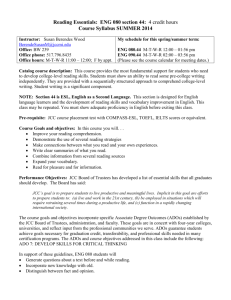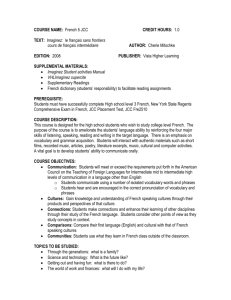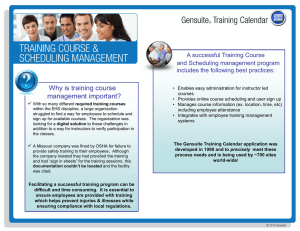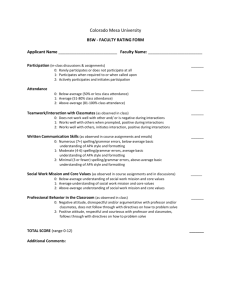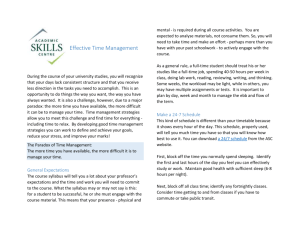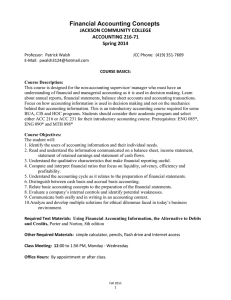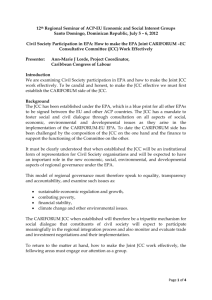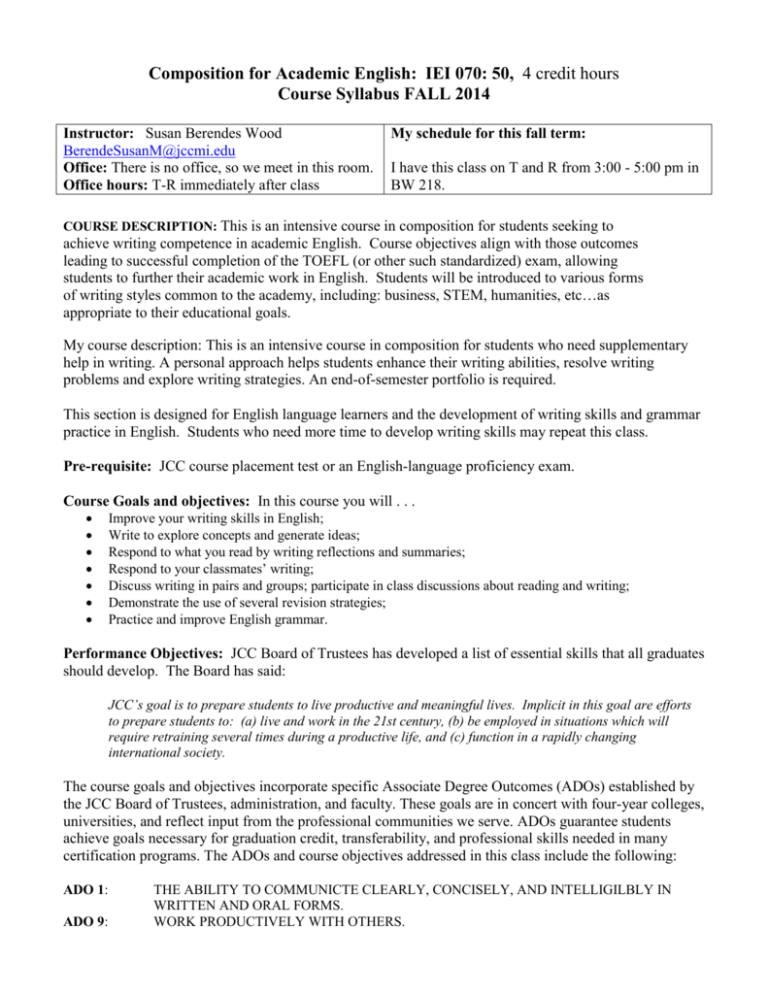
Composition for Academic English: IEI 070: 50, 4 credit hours
Course Syllabus FALL 2014
Instructor: Susan Berendes Wood
BerendeSusanM@jccmi.edu
Office: There is no office, so we meet in this room.
Office hours: T-R immediately after class
My schedule for this fall term:
I have this class on T and R from 3:00 - 5:00 pm in
BW 218.
COURSE DESCRIPTION: This is an intensive course in composition for students seeking to
achieve writing competence in academic English. Course objectives align with those outcomes
leading to successful completion of the TOEFL (or other such standardized) exam, allowing
students to further their academic work in English. Students will be introduced to various forms
of writing styles common to the academy, including: business, STEM, humanities, etc…as
appropriate to their educational goals.
My course description: This is an intensive course in composition for students who need supplementary
help in writing. A personal approach helps students enhance their writing abilities, resolve writing
problems and explore writing strategies. An end-of-semester portfolio is required.
This section is designed for English language learners and the development of writing skills and grammar
practice in English. Students who need more time to develop writing skills may repeat this class.
Pre-requisite: JCC course placement test or an English-language proficiency exam.
Course Goals and objectives: In this course you will . . .
Improve your writing skills in English;
Write to explore concepts and generate ideas;
Respond to what you read by writing reflections and summaries;
Respond to your classmates’ writing;
Discuss writing in pairs and groups; participate in class discussions about reading and writing;
Demonstrate the use of several revision strategies;
Practice and improve English grammar.
Performance Objectives: JCC Board of Trustees has developed a list of essential skills that all graduates
should develop. The Board has said:
JCC’s goal is to prepare students to live productive and meaningful lives. Implicit in this goal are efforts
to prepare students to: (a) live and work in the 21st century, (b) be employed in situations which will
require retraining several times during a productive life, and (c) function in a rapidly changing
international society.
The course goals and objectives incorporate specific Associate Degree Outcomes (ADOs) established by
the JCC Board of Trustees, administration, and faculty. These goals are in concert with four-year colleges,
universities, and reflect input from the professional communities we serve. ADOs guarantee students
achieve goals necessary for graduation credit, transferability, and professional skills needed in many
certification programs. The ADOs and course objectives addressed in this class include the following:
ADO 1:
ADO 9:
THE ABILITY TO COMMUNICTE CLEARLY, CONCISELY, AND INTELLIGILBLY IN
WRITTEN AND ORAL FORMS.
WORK PRODUCTIVELY WITH OTHERS.
In support of these guidelines, composition students will
Produce written work every class day, including paragraphs, short essays and long essays;
Reflect on, discuss and respond to course readings;
Participate in solo reflection, pair work, group work and full-class discussions and activities;
Practice the vocabulary used in college composition courses and the terms for writing process;
Review and practice English grammar and sentence structure.
Textbooks and required materials:
1. Longman Academic Writing 3 by A. Oshima & A. Hogue, publisher Pearson-Longman
ISBN -13-978-0-13-291566-3.
2. English Essentials, by J. Langan & B. Johnson, publisher Townsend Press,
ISBN 1-59194-022-2.
3. A 3-Ring binder, for size 8½” x 11” (that’s important);
4. Loose-leaf filler paper, wide ruled, size 8½” x 11 (that’s important, too);
5. A flash drive to store your work for this class;
6. One 2-pocket folder for your portfolio.
Note: You must KEEP ALL papers from this class in your binder; no loose papers. This binder becomes
your dossier of writing improvement. Bring this to your office visits and writing conferences. Be sure
you keep every draft, every peer review and every paper that you produce for this class.
Your dossier is a record of all your work in this class. The portfolio is evidence of your best work.
Course Components Related to Achievement of Objectives:
1. The final writing portfolio. This includes 3 long essays and 3 reflections, one for each long
essay. You must have at least 10 full pages.
2. Daily class writing. Every day will have some kind of short writing. You might be given a
topic to explore. You might respond to a reading. You might write a letter to a classmate.
There might be a timed-paragraph assignment. These are intended to give you more
practice with writing. These short writing assignments will help you explore some
different types of written assignments that you might have in your college classes. I will
respond to these in some way, depending on the topic that we are studying at that time.
Even if I don’t respond to everything you write, I still consider it assigned work and it will
earn points. Daily writing is excellent practice and practice is the only way to improve.
3. Grammar preparation and quizzes. We will review grammar as needed. We will use the terms
for college composition and the writing process.
Grading Procedure and Grading Scale: Final grades are based on a 4-point scale.
4.0 = 94-100% = 940 to 1000 points.
3.5 = 88-93% = 880 to 939 points.
3.0 = 82-87% = 820 to 879 points.
2.5 = 76-81% = 760 to 819 points.
2.0 = 70-75% = 700 to 759 points.**
1.5 = 64-69% = 640 to 699 points.
1.0 = 58-63% = 580 to 639 points.
0.5 = 52-57% = 520 to 579 points.
0.0 = 0-51% = 519 points and fewer.
**Reminder: A grade of 2.0 or better is accepted as successful completion of the course. Since this
course is a prerequisite to the next writing level and other academic courses, a 2.0 is the minimal grade to
exit. A grade of 2.0 or better will count toward graduation; 2.0 is generally accepted by other colleges for
transfer; 2.0 or better is generally accepted by most scholarships and loans.
4.0 = doing excellent work
3.0 = doing good work
2.0 = doing average work
1.5 and below = doing
poor work and failing
Graded Projects:
400 points:
The final portfolio, submitted on time according to guidelines and with all sections
completed.
300 points:
Written drafts, revisions, peer reviews, daily writing.
300 points:
Grammar practice activities, attendance and participation. [Includes 2 “free days” for
emergencies and one office conference]. There is also some online grammar practice.
Course management, withdrawal and incomplete:
If you stop attending this course, it is your responsibility to complete the paper work for a “Withdrawal.” If
you wish to request an “Incomplete,” the request must be written. If you stop attending this course and do
nothing, you may receive a grade of 0.0. A grade of “W” is the same as a 0.0 and may affect your financial
aid and / or your scholarship(s). If your attendance is unacceptable, you will be dropped from the class.
Unacceptable attendance means that you have missed 6 or more class days. You have 2 “free days” as
allowable absences. You are always responsible for any assignments due during any absence.
Calendar: A more detailed calendar is available on a separate sheet. The detailed calendar lists
assignments, readings, homework, quizzes, papers and any other plans for each day.
02 September, T:
The term begins.
09 September, T:
This class begins.
12 September, F:
Last day to add or drop classes without penalty.
26-28 Nov, W, R, F: Thanksgiving Holiday. College closed.
10 December, W:
Last day to withdraw and earn “W” as final grade.
21 December, S:
The term ends.
Attendance policy:
Attendance is mandatory. If you miss a class due to an emergency, it is your responsibility to contact a
classmate or the instructor before the next class meeting to find out what you need to do to prepare for the
next class. Everyone has busy schedules and responsibilities elsewhere; nevertheless, class attendance
and schoolwork must be high priorities if you are to benefit from the course and receive credit.
Attendance matters!
Makeup Policy: Late work is not accepted. All assignments have due dates. All assignments are due at
the beginning of the class period. Please consult the course calendar for due dates. Please do not do your
assignments during class time. Work is due at the beginning of class.
If you know that you will miss a class for some reason, notify me BEFORE the absence so that you can
make arrangements to stay current. Only negotiated late work may receive a reduced grade. If there is
personal illness or an emergency, I will accept an e-mail or a phone call to that effect. If an assignment is
due on the day of the emergency, a reduced grade may result. Your best action is to telephone or e-mail
me BEFORE class so that you can make arrangements about the missed class and the missed work.
If you miss a class without notification, it is your responsibility to talk with classmates to discover what
work is due for the next class. There are no “make-up” tests and no “extra credit”. If you know you must
miss a class, you may send your assignment by e-mail so it won't be marked late. However, e-mail your
assignment(s) only if you know that you will miss class. The course calendar tells you what is due.
There are always emergencies and illnesses, so everyone has 2“free days” (absences) without penalty.
However, the assignments on those days are your responsibility. You need to negotiate reduced scores.
Don’t be late with an assignment. You can send it by e-mail or drop it into the faculty mailbox. Even
negotiated late work HAS A DUE DATE. Check the course calendar.
Help: Additional support in the form of free tutoring is available in the Center for Student Success. The
CSS is located in Bert Walker Hall Room 123. The CSS also offers help for students with documented
learning disabilities. I recommend the instructors and the services they provide throughout the semester. If
I determine that you are struggling in this course, I may require you to attend tutor sessions at the CSS or
to use a computer software program to improve your skills. I am determined that each student will
succeed in this class, and to that end, I may require that you attend the CSS.
The Center for Student Success also offers referrals for counseling services by social workers. If you have
personal difficulties that are affecting your schoolwork, your personal life or your health, please consider
the help offered through the Center for Student Success at JCC.
Academic Honesty Policy:
The JCC Catalog states, “Academic honesty . . . is the ethical behavior that includes producing one’s own
work and not representing others’ work as one’s own, either by plagiarism, or by cheating, or by helping
others to do so. . . . Faculty members who suspect a student of academic dishonesty may penalize the
student by assigning a failing grade for the [assignment] or a failing grade for the course itself.
Instructors should document instances of academic dishonesty in writing to the Academic Dean.
Classroom participation and etiquette: All classmates must be treated with respect even if their opinions
are different from yours. Class discussions will be polite. A beverage is acceptable during class, but
please, no eating during class since we will be busy discussing the readings. NOTE: Turn off and put
away all cell phones, music players and other technology so that you can concentrate on the activities and
your classmates’ views. I will be grading your participation, so please be ready to discuss the readings in
class. If you are asleep, distracted or distracting others, then you are not participating in the activity at hand.
You will not earn any points if I determine that you are not participating: a cell phone counts as a
distraction. It is rare but possible that I would ask a student to leave the room for uncooperative behavior. I
will respect you as a serious college student if you conduct yourself as one. I will expect your treatment of
me to be respectful as well. You may call me Professor Wood or Mrs. Wood.
Class Time: Each class meeting will include a variety of learning opportunities. I do not plan to lecture
for the whole class period. Instead, the class meetings will include whole-class discussions, small-group
discussions, and limited instruction by me, quizzes, and reading. I hope that you will find the class to be
challenging, fun at times, and worth our effort. Your active participation in class and group discussions
will be expected and will make the class more effective for everyone. One of your personal goals should
be to read a lot and work hard in order to improve your comprehension test scores. I can almost guarantee
your scores will improve if you attend class regularly, spend the necessary time doing homework, do all
the assigned work, participate actively in activities, and get help with anything confusing or difficult.
Reminder: One credit hour of class means that you should spend 2-3 hours of time in homework, reading,
writing journal entries and preparing for class. This 4-hour class means you should spend 8 – 12 hours per
week in preparation. This rule holds true for your other classes as well, so please budget your time.
Caveat: There may be some emergency that would require revisions to the course syllabus or calendar.
For example, severe weather could cause cancellation of classes at the entire campus. Local radio stations
and the JCC website would provide information on this. Instructor illness could also cause changes in the
course calendar. Other events may affect the course calendar including a typing error or a due date that
must be changed. In any case, I will notify the entire class of any changes to the syllabus or calendar. I
will use only the JCC e-mail system to send notes to students. There are options to redirect your JCC
account to your personal e-mail account, but you need to do this yourself. Please remember that I teach
several classes and I have other work to do. I will try to return your e-mail and daily class papers within 2
class days, but definitely within a week.

